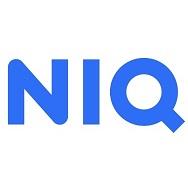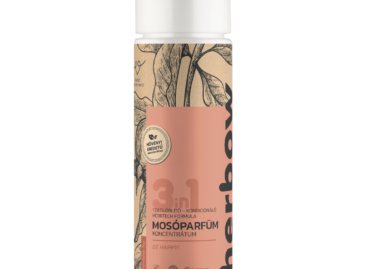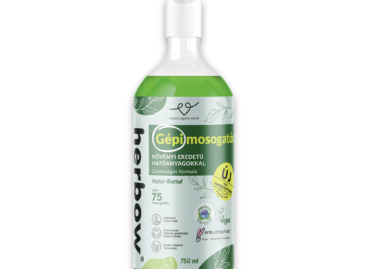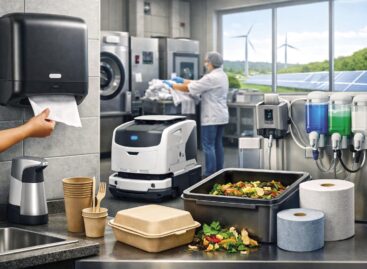Cleanness and caring: new directions in baby care
In 2023 the Hungarian nappy market is expected to grow by over 10% in value compared to the previous year, but a sales decline is likely in volume, according to NIQ data.
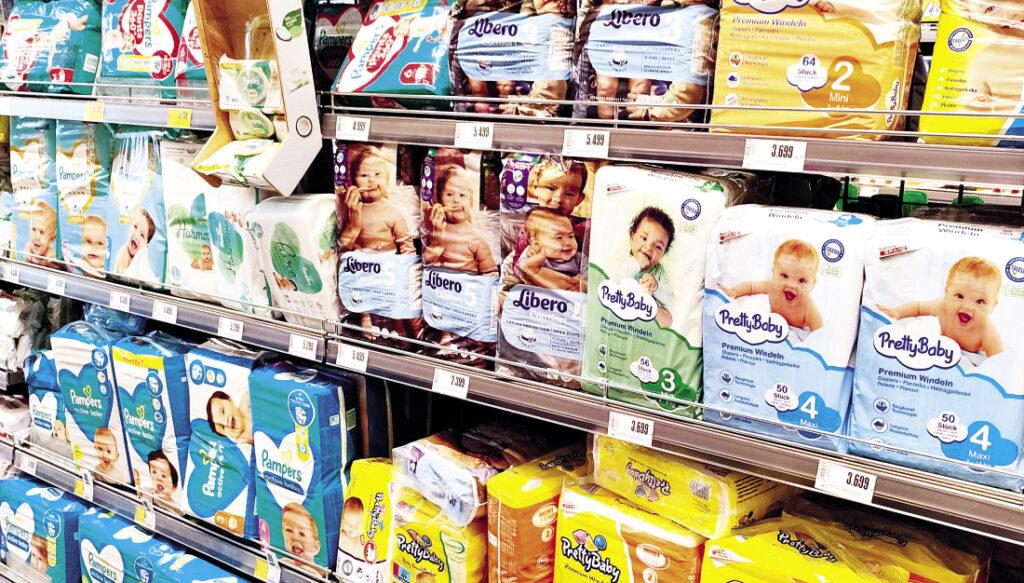
Demand for diaper pants is back on the rise
This article is available for reading in Trade magazin 2024/4
Consumer feedback is important
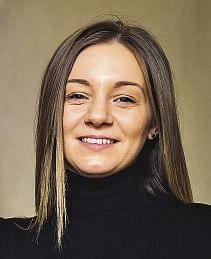
Barbara Horváth
senior category manager
Essity Hungary
“The national figures clearly reveal a shift towards private label products, which produced strong growth last year in both value and volume, significantly increasing their market share in both indicators”,
says Barbara Horváth, senior category manager of Essity Hungary Kft.
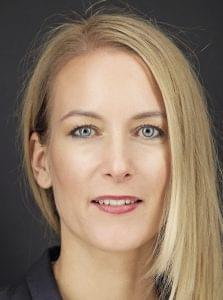
Gréta Tölgyesi
senior brand manager
Essity Hungary
“Essity’s product safety standards are the strictest for nappies, and we also put great emphasis on consumer relations, which includes managing feedback on our products and educating parents”,
says Gréta Tölgyesi, senior brand manager of Essity Hungary Kft.
Parents are looking for leak-proof, reliable solutions – and they want them at good prices. As the clear market leader in the Nordic countries, Libero is also a leader in innovation, but it is a challenge to compete with own brands on price.
New-type needs
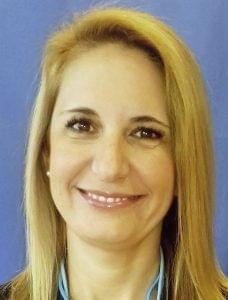
Yvette Krubl
corporate communications manager, CEE
Procter&Gamble
There is a trend of convenience from parents, who aren’t insisting on potty-training their babies as soon as possible.
“Some children use nappies until they are 7-8 years old, which is increasing the demand for larger products”,
explains Yvette Krubl, corporate communications manager of Procter&Gamble in Central Europe.
New parents are searching for premium nappies that are made sustainably, using sustainable raw materials and packaging. Since its launch, Procter&Gamble’s Pampers Premium Care range has been a success story with parents and babies alike. These nappies can stay dry for up to 12 hours, with a wetness indicator strip showing when they need to be changed.
The company also offers special products, such as Night Pants, which have a very high absorption capacity or Ninjamas, which are medical aids for “treating” child incontinence in the 8-14 year age group.
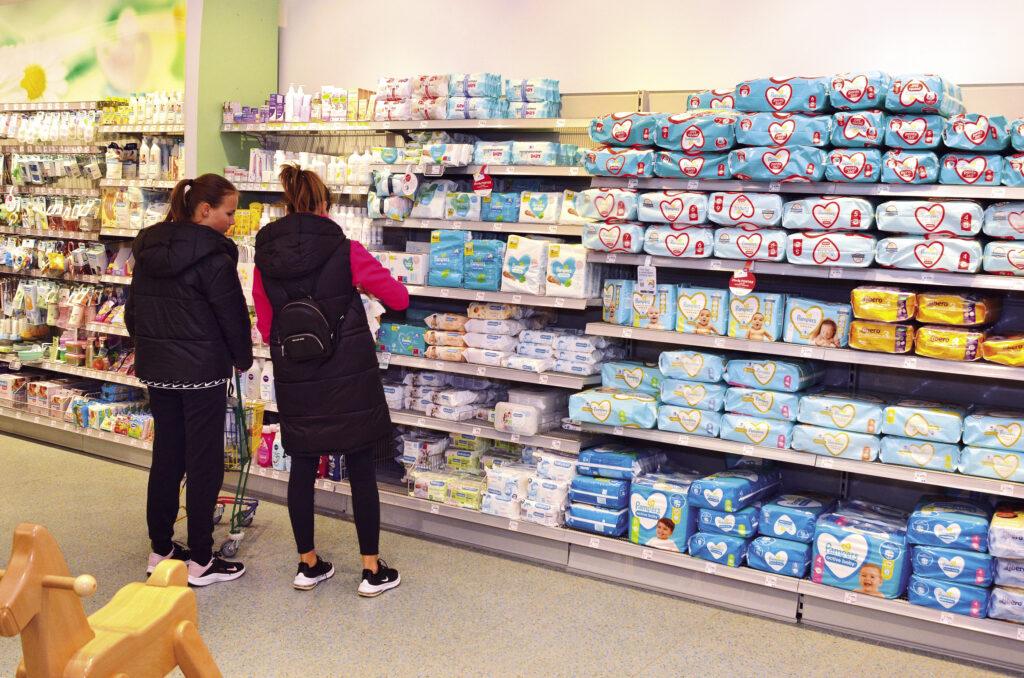
Private label products in the nappy market achieved outstanding growth last year
Economical formats
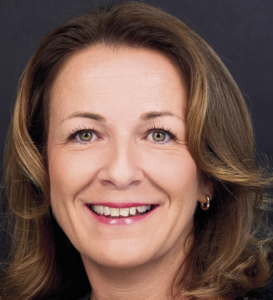
Bernadett Fügedi
brand manager
DunaPro
“Larger packs are becoming increasingly popular in nappy buying, as this way one nappy costs less. The situation is similar with wipes, where people prefer to buy packs of 3 or 4 products in one”,
says Bernadett Fügedi, DunaPro’s brand manager.
The HUGGIES brand has received special attention among DunaPro’s brands in 2023, and the positive influence of this is largely reflected in sales results. Their most popular products continue to be the Extra Care premium range and Overnight Pants night nappies. The company’s priority is to ensure that all ingredients in Huggies® nappies and wipes are safe for babies’ skin. Wipes are 99% pure water, with no perfumes or additives. From last year “smart” HUGGIES EXTRA CARE premium category nappy pants feature two absorption zones.
Changing market environment
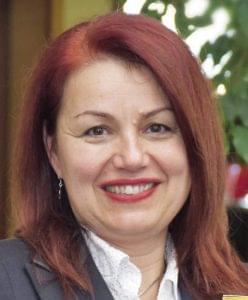
Dr. Anikó Száraz
deputy CEO
Caola
Dr Anikó Száraz, deputy CEO of Caola Kozmetikai és Háztartás Vegyipari Zrt.:
“Because of the inflation and high prices, shoppers have started to look again for old, well-established brands, especially those in the mid-range price segment”.
The baby and children’s cosmetics sector is witnessing a dynamic transformation of sales channels and brands, where digitalisation and sustainability are playing a leading role in the competitiveness of companies and consumer satisfaction. As consumers are increasingly inclined to shop online, both manufacturers and brands have strengthened their online presence.
Sales of Caola’s baby care products doubled both in volume and value from 2022 to 2023, thanks to an increase in demand for baby products and the fact that Caola has revamped some of its previously developed products, which reappeared on store shelves. The new design and packaging immediately captivated consumers, who welcomed the new features. In their innovation work, they pay close attention to the quality of ingredients, skin-friendly formulas and sustainability.
Careful product selection
It is also true for the baby care market that there is a trend towards larger and more economical product size. The most important is that the product should work for the child and meet the skin’s needs, so brand loyalty is strong in the category.
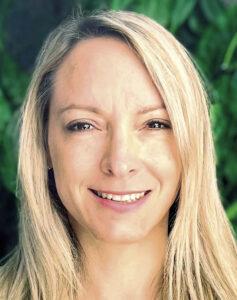
Noémi Makai
marketing manager
Hipp
“Parents choose products based on the recommendations of children’s nurses and paediatricians, but they also often consult various online sites for information”,
says Noémi Makai, marketing manager of HiPP Termelő és Kereskedelmi Kft.
HiPP Babysanft baby wipes don’t contain ingredients that can irritate sensitive skin, and they are made with organic almond oil, one of the most valuable skin care oils. New products include plastic-free Soft&Pure wet wipes with 99.9% water content, the Gentle Care wet wipes with 100% plant-based fragrance and organic almond extract, and the fragrance-free Ultra Sensitive wet wipes with 99% water content.
Many functions
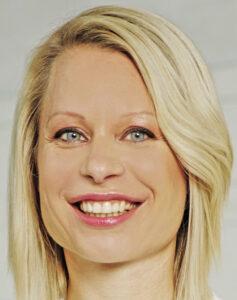
Anna Kintses
brand manager
JimJams Cosmetics and JimJams Baby
“There is a growing number of multifunctional solutions that meet multiple skin care needs, and sustainability and environmentally friendly packaging have become important considerations”,
informs Anna Kintses, brand manager of JimJams Cosmetics and JimJams Baby.
She mentions boosting baby skin immunity and maintaining a healthy skin microbiome as new trends. Parents are looking for products that offer gentle natural cleansing from head to toe, with the smallest disruption to the skin microbiome.
For JimJams Baby products, domestic manufacturing and product development is a priority. With 30 years of experience in cosmetics manufacturing, Alveola Kft. stands behind JimJams Baby, guaranteeing that each product meets the highest quality standards. JimJams Baby wet wipes are particularly popular with consumers, just like JimJams Baby Liquid baby powder. JimJams Baby Baby Wash and Shampoo Foam 3in1 provides gentle cleansing and moisturising.
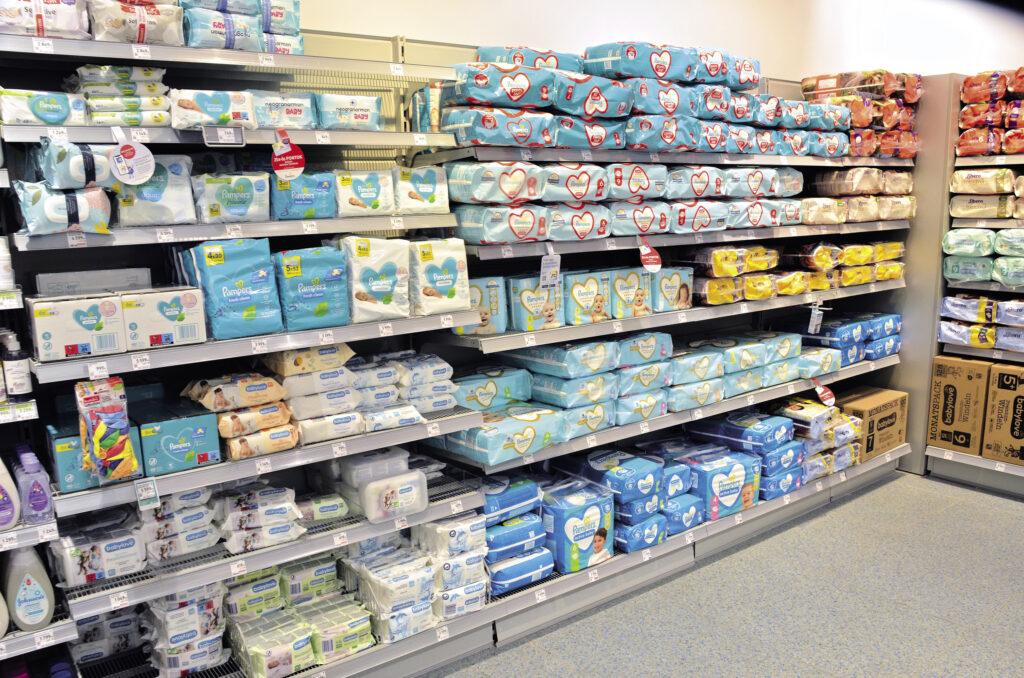
The baby and children’s cosmetics sector is witness to a dynamic transformation of distribution channels and brands
What will the future bring?
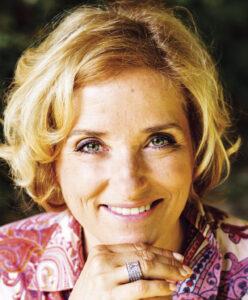
Adrienne Feller
beauty therapist and
aroma therapist,
creator of Adrienne Feller and Panarom brands
Beauty therapist and aroma therapist Adrienne Feller, who created the Adrienne Feller and Panarom brands thinks the demand for sustainable and eco-friendly products will keep growing in the future. The popularity of products made from natural, organic ingredients will also increase, since parents are becoming more conscious of their choices.
“This is where aromatherapy is gaining ground, as even the youngest children can safely use these products, thanks to their natural ingredients and high purity”,
points out Adrienne Feller.
Panarom offers numerous 100% natural products that can be used from newborn age, such as Napsugár cream, Mesélő Hold essential oil blend, Bebelle balm and Pocak and Bébi massage oils. The company has recently rolled out several new products: Panarom Pocak massage oil can be used from newborn age, and it was created to relieve tummy ache periods.
Who really decides?
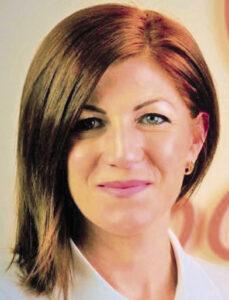
Szilvia Bödő
managing director
Biocontour
Research results from BioContour International Kft. show that the buying motivations of mothers are influenced by a couple of basic needs, such as family harmony, maternal care, maternal protection and keeping their children happy.
“Directly and indirectly, 2-year-olds already influence 45-47% of purchases. They can even influence the buying of cosmetics, as they are already very receptive to patterns and colours at this age, so they can try to convince their mother to buy a product with a packaging they like”,
explains business development manager Szilvia Bödő.
The BioContour Baby&Kids range consists of a Baby Wash&Shampoo, a Baby Body Cream and a Baby Bum Cream, all of which are Naturix certified natural cosmetics for babies and children. Created in collaboration with dermatologists, these natural cosmetics are made from high quality natural ingredients, e.g. shea butter, olive oil, grapeseed oil and D-Panthenol.
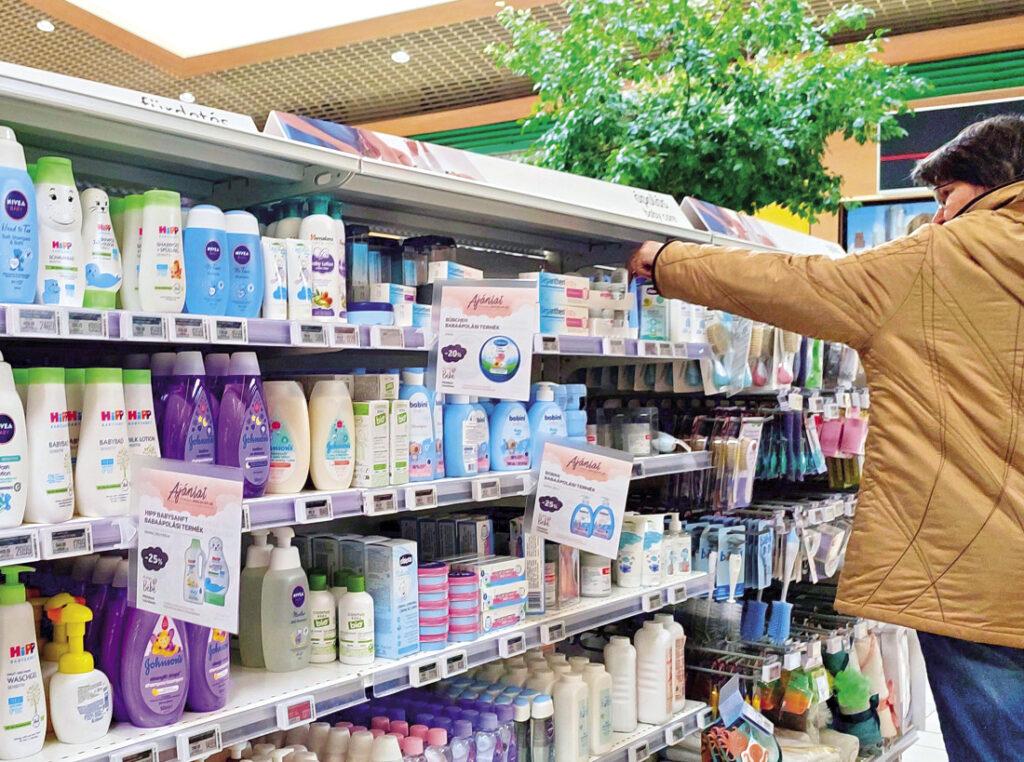
The innovations are based on natural ingredients and skin-friendly formulas
Clean baby clothes
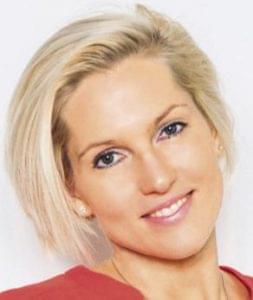
Katalin István
marketing manager
Herbow International
Baby and toddler skin is much more sensitive and requires careful care.
“The number of children with allergies and eczema is rising year after year, and the reason behind this can be both contact and food allergy. Chemical detergents can be full of harmful chemicals and artificial fragrances that can irritate a baby’s delicate skin, causing eczema on contact and allergic reactions if inhaled”,
says Katalin István, marketing director of Herbow International Zrt.
The company has developed Herbow Baby detergents containing plant-based ingredients and natural soapnut extract, which can be used to keep baby’s clothes hygienically clean in skin- and environmentally-friendly way.

László Takács
assortment manager
dm
Dm produced significant value sales growth in the baby and child hygiene segment in 2023, while volume sales showed a small increase compared to the previous year. The most popular products in this category are diaper rash creams, followed by bath products and shampoos.
“The effect of inflation is also evident in this category. This has made dm’s strategy of not increasing prices for 4-month periods even more important. Thanks to the permanent prices, we can ensure predictability”,
says László Takács, assortment manager of dm Kft. //
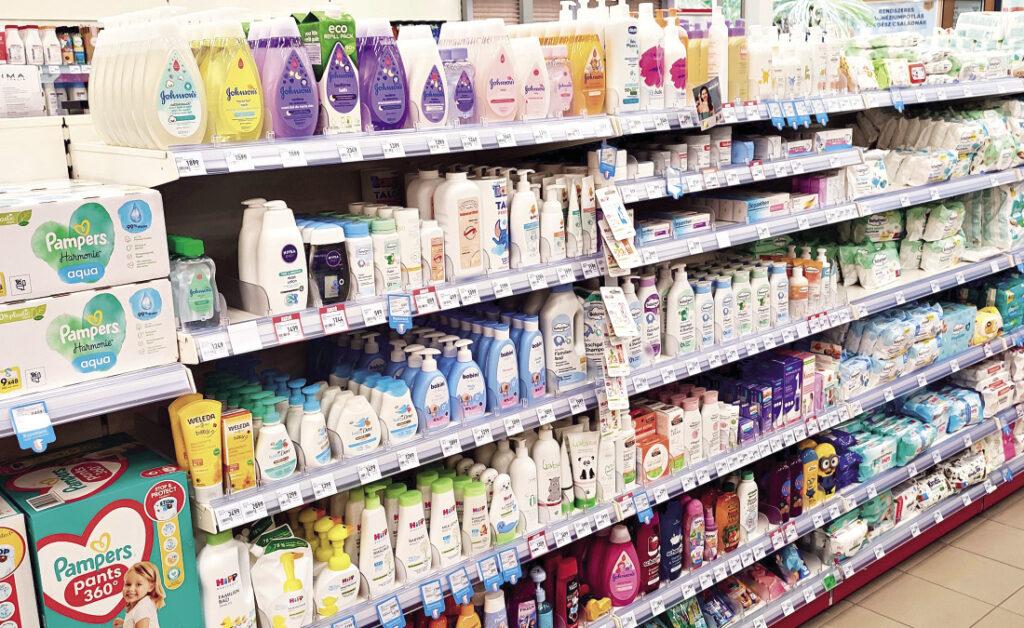
Demand for sustainable and environmentally friendly products is expected to further increase
//
Baby care product sales haves shifted towards drugstores and private labels
The four baby care categories (nappies, baby wipes, baby powder, and baby oil) audited by NIQ generated HUF 43bn sales between January and December 2023 – this was an increase of 13% compared to the previous period.
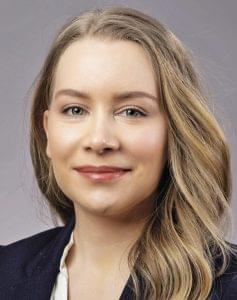
Guest writer:
Katalin Séra
senior analyst
NIQ
Nappies for 31 billion
In the period under review HUF 31bn worth of nappies landed in shopping baskets, a 13% rise vs. the January-December 2022 period. However, in volume sales the NIQ retail index registered a 1% drop. Drugstores are the main places for nappy buying, as they realised 66% of value sales, which was 5 percentage points more than in the same period last year. The market share of branded products reduced from 61% to 53%. As for baby wipes, 13 million packs were sold in the value of HUF 11bn. This was a 12% increase in value, but volume sales declined by 4%. Drugstores accounted for 53% of the market, up 5 percentage points. Private labels were responsible for 47% of sales, with a 21% increase in value and 6% in volume.
Baby powder volume sales drop
Nearly HUF 500m worth of baby powder was lifted off the shelves, up 5% year-on-year. In volume the category contracted by 8%. Value sales were concentrated in drugstores here as well, whose market share climbed from 46% to 49%. Private labels were also on the rise, with a double-digit growth in value and volume, increasing their share from 14 to 20%. Baby oil sales stopped at HUF 357m, which was still 20% more than in the previous period, but volume sales were down 2%. The market is dominated by drugstores, which accounted for 71% of sales, compared with 63% between January 2022 and December 2022. Manufacturer brands realised 87% of sales, growing by 17% in value and 1% in volume terms. //
Related news
Herbow 3in1 laundry perfume
🎧 Hallgasd a cikket: Lejátszás Szünet Folytatás Leállítás Nyelv: Auto…
Read more >Hygiene on new foundations
🎧 Hallgasd a cikket: Lejátszás Szünet Folytatás Leállítás Nyelv: Auto…
Read more >Related news
Nestlé to sell remaining ice-cream assets but commits to Froneri venture
🎧 Hallgasd a cikket: Lejátszás Szünet Folytatás Leállítás Nyelv: Auto…
Read more >Lidl guarantees fairer prices for cocoa farmers
🎧 Hallgasd a cikket: Lejátszás Szünet Folytatás Leállítás Nyelv: Auto…
Read more >40 secure jobs, sustainable solutions – new BURGER KING® in Csepel
🎧 Hallgasd a cikket: Lejátszás Szünet Folytatás Leállítás Nyelv: Auto…
Read more >

